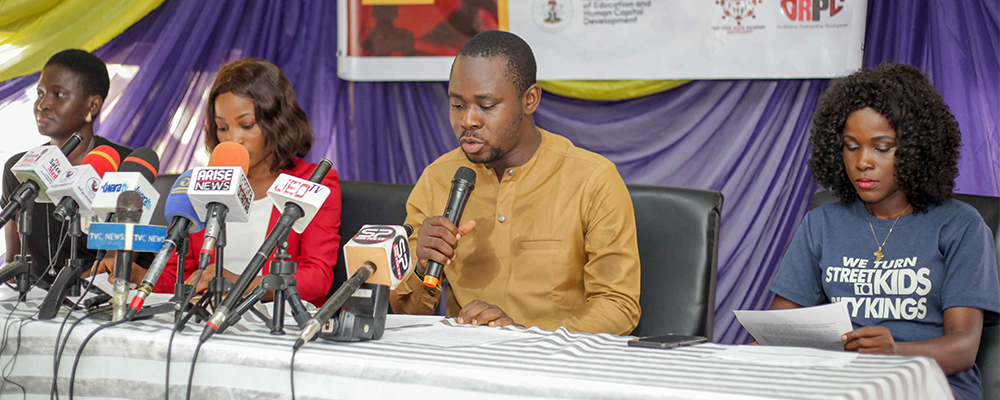#GAWE2022: The Need for Quality and Inclusive Education for All. Our Schools Must Be Safe.
#GAWE2022: The Need for Quality and Inclusive Education for All. Our Schools Must Be Safe.

A school is a place where we build people's future, which we call future leaders. It is a place where we cultivate the future of our country. The case in Nigeria has proven to be different from the abduction of 1114 school children in the past year. The Nigerian schools have been subjected to attacks since 2011, and children bare the brunt of war between the Nigerian government and terrorist groups.
When the Chibok girls were abducted in 2014, the world believed that the kidnapping was a one-stop thing and would not occur again. Today, attacks on schools and abduction of school children have become so routine that it doesn’t bother many Nigerians.
Thousands of children in the region have been killed, maimed, abducted, displaced, and experienced multiple human rights violations. On many occasions, the attacks were meted out on the children while in school, where they are being taught to become leaders and contributors to the country’s social and economic development.
UNICEF Nigeria’s office has repeatedly stated that millions of Nigerian children have been caught up in zones characterised by violence. This, no doubt, has resulted in hundreds of thousands of students dropping out of school in the affected regions. With households fleeing their country home and IDP Camps rejecting new applicants because they are occupied beyond capacity, children have been forced to live without education.
The Nigerian education system and structure have been under pressure from the attacks from the terror groups since they began in 2009. The attacks have taken different forms; attacks on students, teachers, and other education personnel; military use of schools and universities; forcing or attracting (recruiting) children into joining armed groups at school or on the way to school; sexual violence at, or on the way to or from, school or university and attacks on higher education.
Following the abduction of school children in Borno State, the Nigerian government rushedly announced the commencement of the Safe School Initiative at the World Economic Forum in Abuja. The initiative was designed to ensure all schools in Nigeria are safe from attacks in the future.
The Safe Schools Initiative, at the start, was expected to reach over 500 schools, especially in vulnerable areas, through a $10 million fund pledged by a coalition of Nigerian business leaders, working with the United Nations Special Envoy for Global Education, and others. The following day, the government committed an additional $10 million. During the next weeks, commitments were made by the United Kingdom, Norway, Germany, and the African Development Bank to support the initiative.
Several promises as to the implementation plan of the programme designed to keep the school environments safe were made. Today, it is not clear how much has been raised and how much has been done to keep schools safe. However, a document (Nigeria Safe Schools MDTF Financial Reporting on Sources and uses of funds for the period ending 31 December 2019 indicated that $1,750,240 was donated in 2018. In that same year, $1,736,316 was spent, according to The Guardian.
Safe School Initiative, though recording little success, Safe School Initiative is one among several initiatives that have been praised as the solution to the issue of school children abduction in Nigeria and has failed to meet its targets like many others of such initiative. The Nigerian education system has suffered from several other attacks, and they all have proven that the system is vulnerable and less prepared to protect learners. The outbreak of COVID-19 exacerbated the situation. The statistic has it on record that Nigeria has the highest number of out of school children.
There’s an unnegotiable need for the schools to be safe for learning, the students and the teachers, and other persons involved in the educational structure. There is thee need to cultivate practices and policies that keep the school a safe haven for the children in Nigeria.
To keep the school safe, there is the need for all stakeholders to frontline the commitment. There is a need for the school to put in place a structure that could prevent invasion, and the teachers should be able to carry out preventive surveillance. All the schools create a security plan that enables the school children to know what to do whenever there is an emergency.
Schools with boarding facilities must be adequately fenced, with gates and CCTVs installed and adequately lit. Building new schools and renovation of school buildings should have provision for strong windows and doors to create safe rooms that will help school authorities fortify the protection of children in case of any alarming situation before external help will come from outside. The picking up of children after school hours should be seriously monitored. Only parents or duly assigned students should be allowed to pick students from schools. School buses should be registered with ministries of education and security agencies, and they should be closely monitored by security agencies while picking up and dropping off children. This will help transmit information to these buses carrying children in case of security risks suspected or occurring along their routes to halt them before they run into such risk areas while transporting children. School management should also inspect all school buses before take-off, and drivers’ numbers and IDs should be ready for supply to relevant agencies when quickly needed. Where possible, school buses should have tracking devices installed to help in recovering buses and students in extreme cases.
Written by: Olasupo Abideen
Olasupo Abideen is a Good Governance, Youth Investment, Education activist and Public Policy enthusiast. He tweets @opegoogle.


